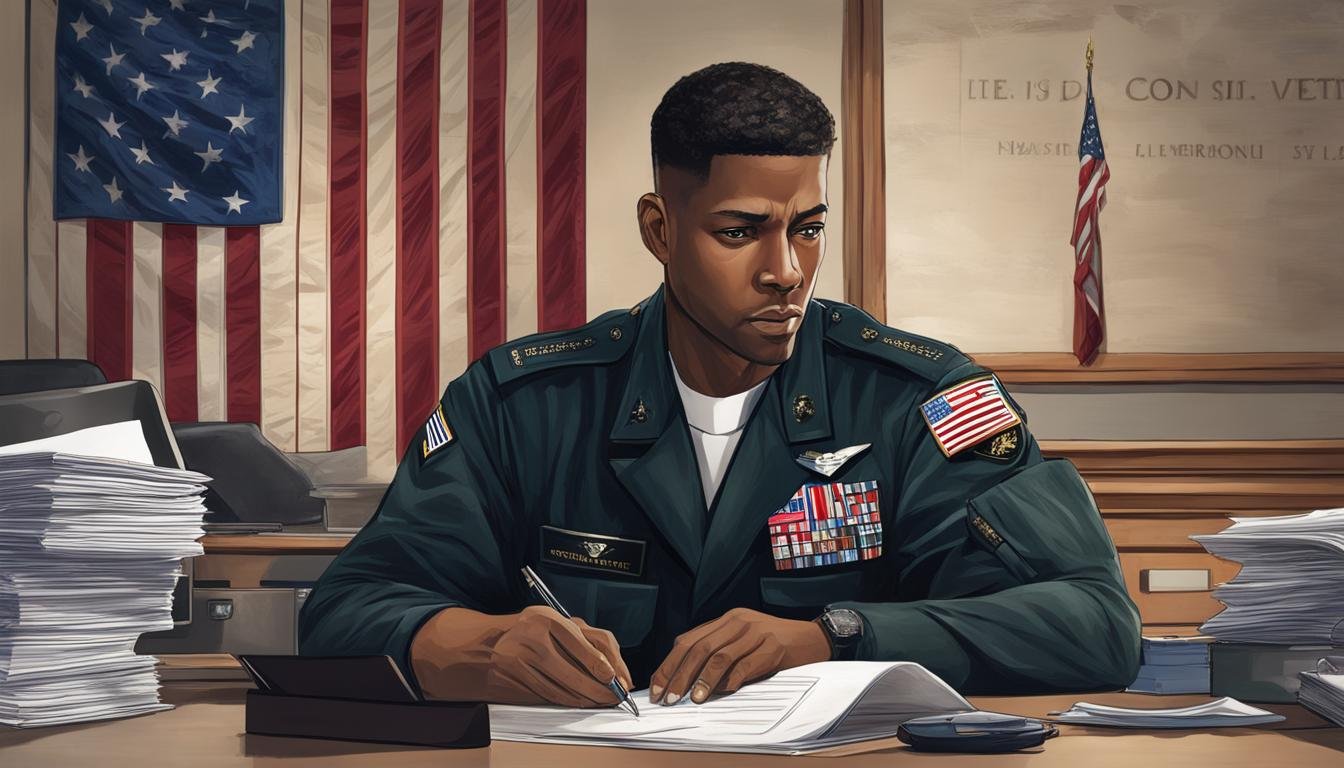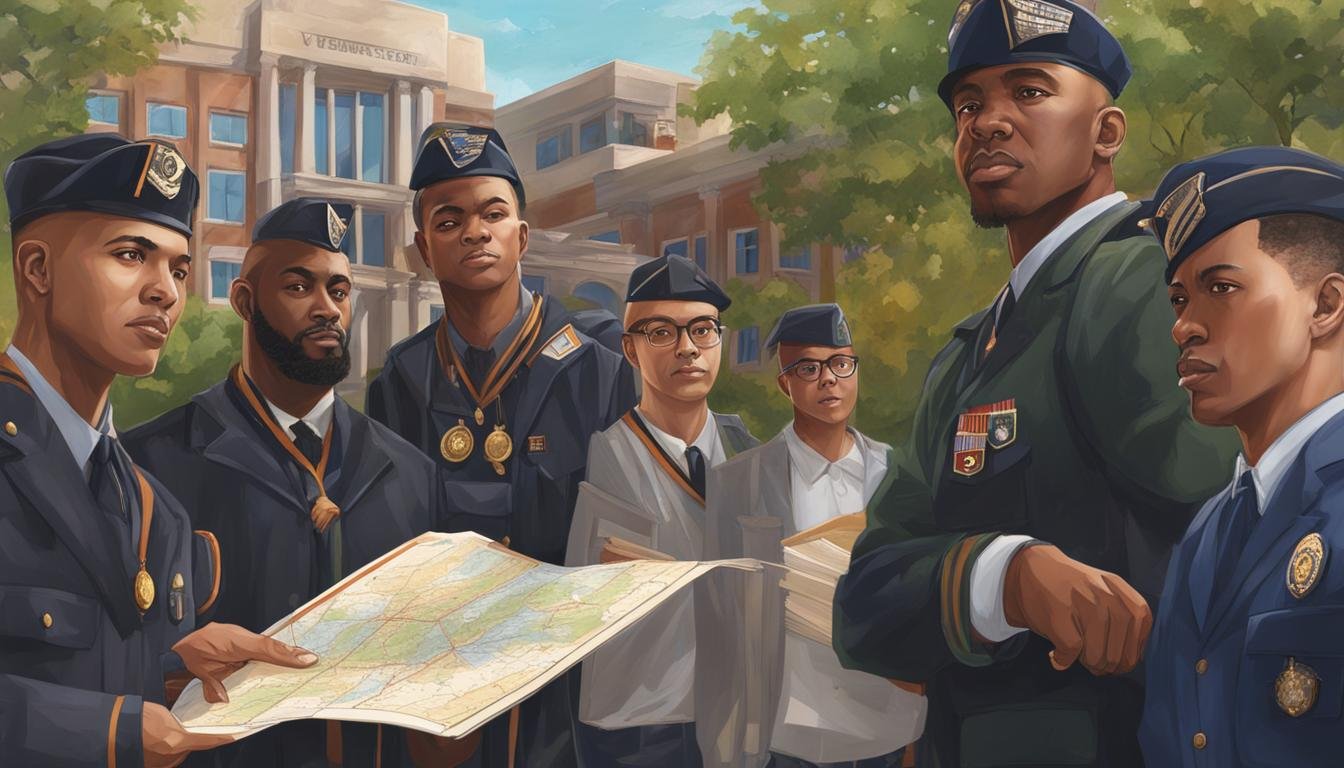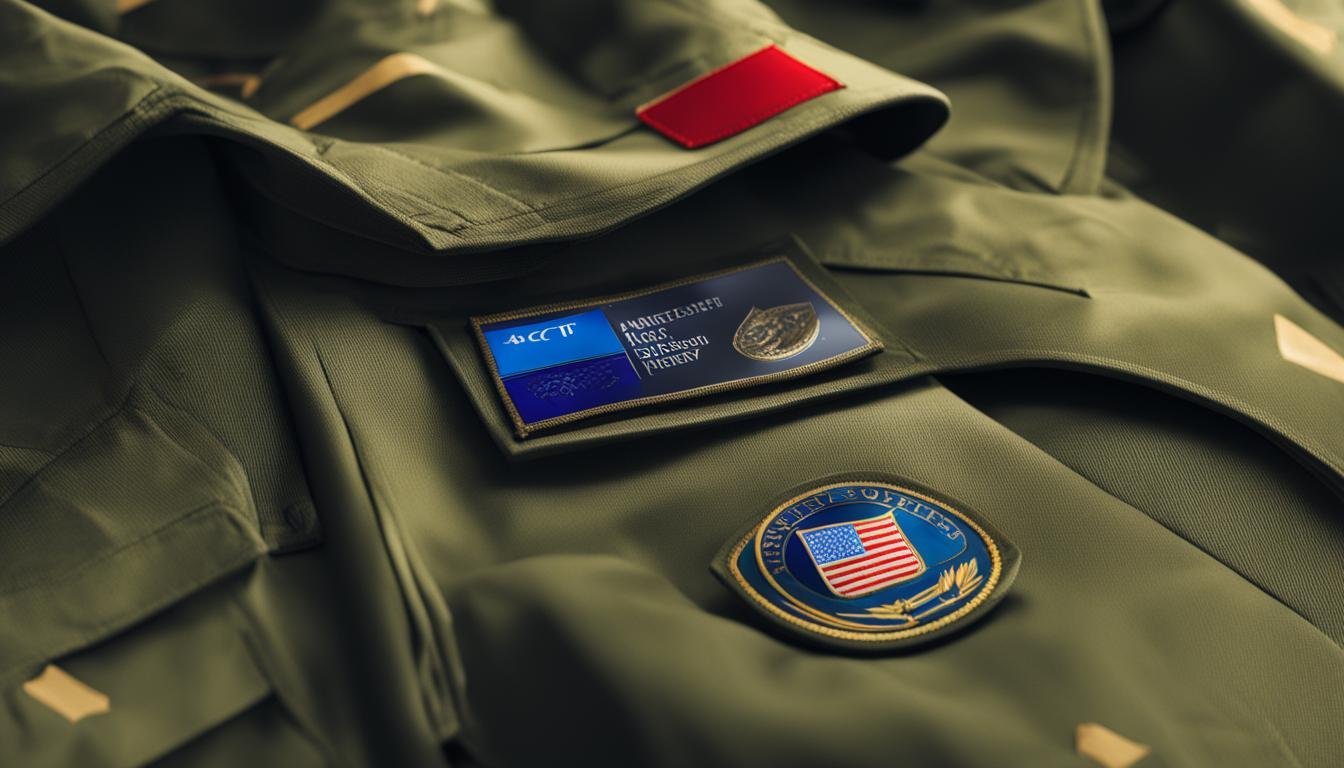Embarking on a journey through higher education can be both an exciting and daunting transition for veterans. If you’re a veteran navigating the college admissions process, understanding the nuances of standardized testing is a crucial step. As you consider diving back into education, the GI Bill benefits stand as a steadfast ally, designed to facilitate your path to academic success. With resources specific to the needs of military students, preparing for critical assessments like the SAT/ACT becomes a manageable task. In this guide, we’ll explore the wealth of college admissions resources for veterans, structured to support your preparation for these standardized tests and to help streamline your transition from military to academic life.
Whether it’s your first time holding a pencil for the SAT or you’re aiming to score higher on the LSAT, know that your GI Bill benefits cover a wide array of nationally approved tests. This versatile support extends beyond test fees—it’s a gateway to new opportunities and a testament to your dedication to lifelong learning. So, let’s delve into the detailed process of how to effectively utilize your GI Bill benefits and take confident strides toward your educational goals.
Standardized Testing and College Admissions for Veterans – Key Takeaways
- GI Bill benefits can be used to cover fees for essential standardized tests for college admissions and professional exams.
- The VA will reimburse you for various test fees, promoting ease in your academic endeavors.
- Understanding how to apply these benefits is integral in navigating the college admissions process for veterans.
- SAT/ACT preparation can be tailored to accommodate the experiences and skills of military students.
- Familiarize yourself with the VA’s reimbursement process, including submitting VA Form 22-0810 under certain conditions.
Understanding the Importance of Standardized Tests for Veteran College Applicants
As a military student, you may find that standardized tests like the SAT and ACT are pivotal in the college admissions process. These assessments provide colleges with a glimpse of your academic prowess and readiness to take on higher education challenges. Recognizing the importance of SAT/ACT scores is especially crucial when transitioning from the structured military environment to the autonomy of college life.
The challenge of balancing military duties with SAT/ACT preparation can seem daunting, but military experience equips you with unique skills that can contribute to your testing performance. The dedication, discipline, and problem-solving abilities fostered during your service are assets that can enhance your preparation strategy and ultimately, your test scores.
Approaching test preparation methodically and utilizing resources effectively are key strategies for you to conquer these standardized tests.
The analytical skills and attention to detail honed in military service can be your greatest allies in mastering the SAT and ACT exams.
- Understand the test structures and question formats.
- Develop a study schedule that integrates test prep into your military commitments.
- Practice with.test-specific resources and materials.
Your military training may have been rigorous, but the strategic planning and perseverance that you applied there can now be used to excel in your SAT or ACT preparations. Realize how the skills you have acquired not only benefit your academic pursuits but also highlight the multifaceted talents you bring to a college community.
Table: How Military Experience Influences SAT/ACT Performance
| Military Skill | Benefits in SAT/ACT Prep |
|---|---|
| Discipline | Facilitates a consistent study regimen. |
| Adaptability | Helps you adjust to various question types and test environments. |
| Time Management | Assists in effectively pacing yourself during time-restricted sections. |
| Problem Solving | Enhances analytical thinking for complex questions. |
| Attention to Detail | Aids in catching subtle cues in reading comprehension and error detection. |
As you integrate test prep into your usual routine, remember to leverage the unique benefits your military experience imparts. You may find yourself not only prepared for the SAT or ACT but also poised to bring a distinctive perspective to your future academic endeavors.
The Role of GI Bill Benefits in Covering Test Fees

If you are a veteran considering furthering your education or seeking professional certification, understanding how your GI Bill benefits assist with the financials of standardized testing is vital. The GI Bill offers test fee reimbursement for a variety of exams, alleviating the financial burden of college admission tests like the SAT, ACT, and graduate-level assessments such as the GRE and LSAT. These benefits are extended to cater to your unique needs as military students, allowing you to focus on preparation and performance rather than cost.
Approved National Tests for Veterans
The GI Bill benefits cover fees for a wide range of tests, ensuring that you can take advantage of this opportunity to enhance your career or educational aspirations. For veterans aiming to attend college or pursue higher education, the following exams are included in the test fee reimbursements:
- Scholastic Assessment Test (SAT)
- American College Testing Program (ACT)
- Graduate Record Exam (GRE)
- Law School Admission Test (LSAT)
- And many other professional and college admission exams
These covered tests not only qualify you for college admission but also lay the groundwork for graduate studies and professional licenses.
Eligibility and Application Process for Test Fee Reimbursement
As a veteran, you are eligible for test fee reimbursement for veterans provided you have applied for and are eligible for GI Bill benefits. To apply for reimbursement, utilize the VA Form 22-0810 (Application for Reimbursement of National Exam Fee). In most instances, submission of receipts is not required, ensuring a smooth and uncomplicated process. However, keep in mind that certain exams, such as the DSST, may require proof of payment with your application.
The GI Bill entitlement is charged proportionally based on the test’s cost, at a rate of one month of entitlement for every $2,200.96 paid out in benefits. This rate will see a slight increase to $2,260 starting on August 1, 2023. Here’s a clear breakdown of how your benefits cover the fees:
| Cost Component | Coverage by GI Bill |
|---|---|
| Registration Fees | Yes |
| Fees for Specialized Tests | Yes |
| Administrative Fees | Yes |
| Pre-test Fees (e.g., Kaplan) | No |
| Score Rushing Fees | No |
| Optional Item Fees | No |
With this coverage, GI Bill benefits significantly reduce the costs you may face as you prepare for and take the necessary standardized tests, making your academic journey more accessible.
Make full use of your educational benefits, as they are designed to support your success throughout your transition to higher education and beyond.
Remember to stay updated by visiting the Military.com website or contacting the VA for the latest information regarding the GI Bill application and reimbursement process, as changes can occur that may affect your benefits.
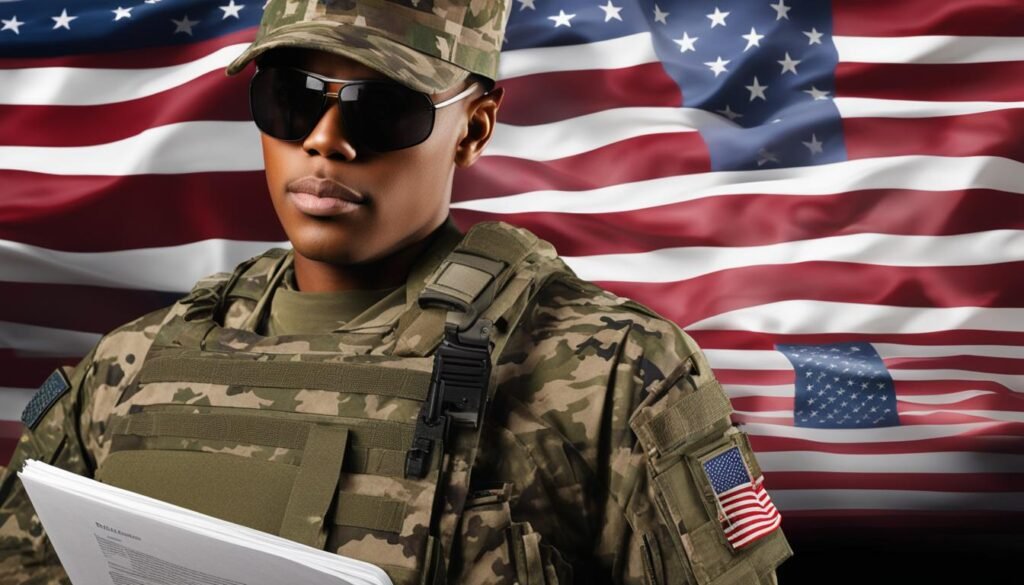
The path to higher education can pose distinctive challenges for veterans, many of whom have sacrificed significant time away from traditional academic environments. If you’re embarking on the veteran college application process, it’s essential to recognize and prepare for the unique aspects of the college application for military veterans. A step-by-step guide to the college application process for veterans can serve as an invaluable resource, providing a tailored roadmap that acknowledges your service and experiences.
One of the first steps in this journey is understanding how military experience is translated within college applications. Veterans have access to special considerations and resources designed to acknowledge the skills and leadership acquired through service. Additionally, schools often look favorably upon the diverse perspectives that veteran applicants bring to their campuses.
When applying to college, military transcripts and potential transfer credits play a pivotal role. It’s crucial to request your Joint Services Transcript (JST) early in the application process, as it will outline your military training and experience in a format that civilian educational institutions can evaluate.
Beyond the transcript, you’ll need to navigate through application essays, letters of recommendation, and perhaps interviews. Each of these components offers an opportunity to showcase how your military experience has equipped you with unique skills and a strong work ethic—attributes that are highly valued in higher education settings.
Embrace your military experience as a strength and let it shine throughout each stage of your college application. It’s not just about where you’ve been, but also about where your journey can take you.
The table below provides a concise overview of the various application components and how your veteran status can be integrated to enhance each one.
| Application Component | Integration of Veteran Experience |
|---|---|
| Transcripts | Include JST to translate military experience and training |
| Essays | Highlight leadership, resilience, and service-driven experiences |
| Letters of Recommendation | Consider endorsements from military supervisors who can attest to character and work ethic |
| Resumé | Detail both military roles and any civilian work or volunteer experiences |
| Interviews | Prepare to discuss how military service has prepared you for college-level work |
It’s also important to be aware of special admissions tracks or resources offered by colleges for veteran students. Programs like the Veterans Upward Bound (VUB), which is designed to help veterans refresh their academic skills, can provide tailored preparatory support.
- Research schools with veteran-friendly programs and strong support systems.
- Understand how your GI Bill benefits will integrate with prospective colleges’ financial aid.
- Visit campuses if possible, focusing on those that offer veteran-specific orientations and resources.
- Connect with other veterans on campus through student veterans organizations.
As a veteran, your journey through the college admissions process is unique. Armed with the right information and resources, your service experience can become one of your greatest assets in pursuing academic success.
College Application Tips: Highlighting Military Experience
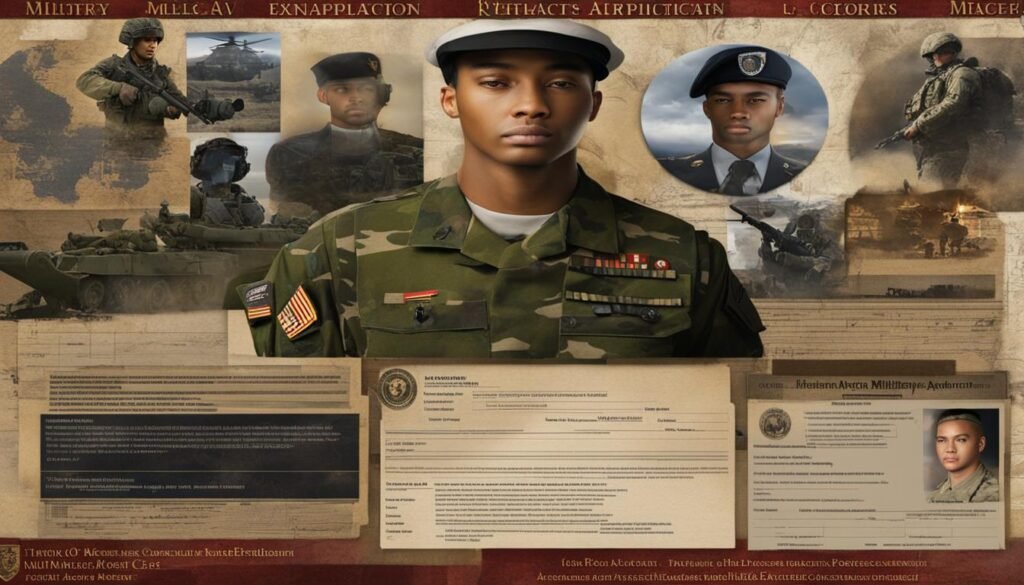
When you’re preparing to transition from the military to the halls of academia, it’s essential to know how to highlight military service in college applications. Your experiences in the service have given you a wealth of soft skills, leadership capabilities, and life experiences that set you apart. To craft a compelling narrative for your college application, focus on articulating how your military experience has prepared you for success both academically and personally.
Veteran-friendly college application strategies often include weaving your military background into the fabric of your personal statements and essays. Universities admire applicants who can bring a diverse range of experiences and viewpoints to the table, and your military background is a powerful component of that.
As you sit down to write your college essays, think about the moments during your service that shaped your character, determination, and leadership — these are the stories that can help your application resonate with admissions officers.
To ensure your application stands out, integrate concrete examples of how the skills you’ve gained in the service translate to the academic environment. Use the following guide to match your military-acquired skills with attributes that colleges value:
| Military Skill | College-Applicable Attribute |
|---|---|
| Leadership | Capacity to contribute to class discussions and group projects |
| Adaptability | Flexibility in coping with academic challenges and changes |
| Problem Solving | Ability to tackle complex research questions and coursework |
| Teamwork | Working collaboratively with diverse groups of people |
| Technical Skills | Bringing practical, hands-on experience to technology-centric fields |
When delving into the art of crafting a compelling personal statement as a veteran, focus not just on the narrative of your past but also on your future aspirations. Communicate how your military service is an asset that will contribute to the college community and your intended field of study.
- Reflect on your service achievements and how they demonstrate your readiness for college.
- Describe any specific responsibilities or roles that showcase your leadership and work ethic.
- Consider discussing how overcoming challenges in the military has prepared you for handling the pressures and rigors of college life.
Your personal statement is an opportunity to give a voice to your application, making you more than just a set of numbers or a list of accomplishments. It’s where you tell the story of who you are, what you’ve done, and what you stand for — and, more importantly, why that matters for your college journey.
In addition to writing about yourself, you can use letters of recommendation to further highlight your military service. Opt for recommenders who can speak to your character, work ethic, and potential as seen through your military service. This might be a former commander, a peer with whom you’ve served, or a civilian who has witnessed your transition from military to civilian life.
By strategically emphasizing your military background throughout your college application, you communicate to institutions that you have a proven track record of overcoming adversity, a commitment to excellence, and a readiness to tackle the demands of higher education.
How Military Service Can Influence College Admissions Decisions
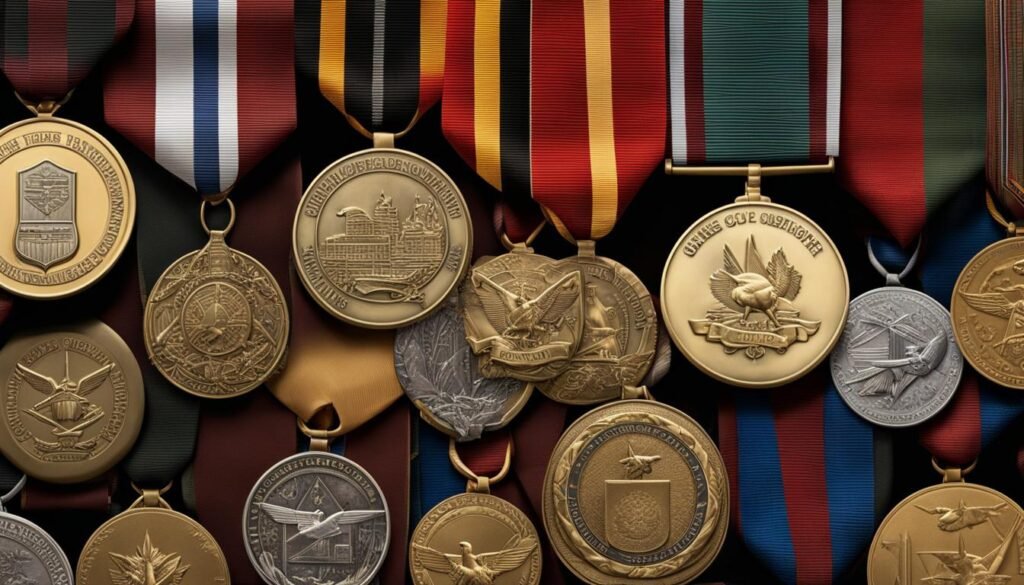
When it comes to military service and college admissions, your unique experiences don a cloak of valor that extends far beyond the battlefield and into the halls of academia. Institutions of higher learning often place a considerable degree of importance on the diverse perspectives and life lessons that service members bring to their campuses. In this vein, your military service is not only an emblem of honor but also a unique factor in college applications that can set you apart in a sea of hopefuls.
Understandably, you might wonder how colleges view military service in admissions. Point blank, it’s seen as a positive. Colleges and universities across the nation recognize the intrinsic values of discipline, leadership, and maturity instilled in military personnel. These attributes are regarded as cornerstones of success both within and outside of academic settings. Thus, your service could be mirrored in the form of preference and reverence during the admissions process.
Indeed, as a veteran, you bring to the college a wealth of real-world experience, a nuanced understanding of global issues, and an ability to lead by example. It’s these very skills that make your application resonate with admissions officers who are in pursuit of well-rounded, seasoned individuals to enrich their collegiate communities.
Colleges recognize that veterans are often non-traditional students who bring a sense of determination and a unique perspective that can greatly benefit the student body.
To illustrate this point, we’ve compiled data that sheds light on the beneficial impact of military service in the realm of college admissions:
| Attribute Acquired from Military Service | Impact on College Admissions |
|---|---|
| Discipline and Time Management | Signals a student’s ability to handle rigorous academic schedules and deadlines. |
| Leadership and Teamwork | Indicates a potential for meaningful contributions to class dynamics and group projects. |
| Diverse World Experiences | Brings a global perspective to classroom discussions, enriching the educational experience for all students. |
| Problem-Solving Skills | Demonstrates an applicant’s capacity to approach complex issues with innovative solutions. |
| Resilience and Adaptability | Reflects an individual’s ability to thrive in changing environments, a key aspect of college life. |
It’s clear that military service, observed through the lens of college admissions, is more than just a stint of service—it’s a testament to a rich tapestry of expertise and life lessons that you’re ready to weave into your academic endeavors. As you prepare for the college admissions process, remember to highlight these multifaceted experiences, allowing your military background to illuminate the path towards higher education success.
- Translate your military missions into college admission essays to demonstrate problem-solving and leadership.
- Speak to the versatility of your military training when selecting your potential major or area of study.
- Consider colleges with robust veteran support networks that value and recognize your service experience.
Rest assured, your dedication to country and the ingenuity that comes with your military background can serve as compelling components of your college application, often swaying admissions decisions in your favor.
Preparing for the SAT/ACT: Strategies for Veteran Students

As a veteran gearing up for college, acing standardized tests like the SAT or ACT can play a vital role in your college admissions process. Crafting an effective standardized testing preparation strategy is pivotal, considering the unique challenges and strengths you bring as a military student. Plan to make use of the robust online resources for SAT/ACT preparation available for veterans. These resources are tailored to align with your experiences and the dedicated discipline honed during your service.
Study Resources and Preparation Tips for Military Students
Embarking on the journey of SAT/ACT prep, first ensure that you’re tapping into tailored SAT/ACT prep courses specifically designed for military students. These courses offer flexible schedules to accommodate your service responsibilities, recognizing the need to fit study around duty.
Additionally, take advantage of the multitude of online resources for SAT/ACT preparation that are directed at veterans. These digital platforms are not only convenient but often feature practice tests, personalized coaching, and study modules that address educational gaps you might face after your time in service.
Remember, the discipline and precision you’ve cultivated in the military can be translated into a structured and comprehensive study plan.
- Develop a consistent study timeline that aligns with your military and personal commitments.
- Seek feedback and guidance from mentors or tutors experienced with the learning styles of veterans.
- Assess your strengths and areas for improvement frequently to adjust your study strategy effectively.
Understanding SAT/ACT Waiver Options
Knowing about potential SAT/ACT fee waivers and test-optional policies can be a crucial aspect of your test prep plan. Veteran-friendly colleges may acknowledge your service by offering financial flexibility with these standardized tests, thus easing one aspect of college admissions costs.
To understand SAT/ACT waiver options, consult with the admissions offices of the colleges you’re interested in. They will inform you if they have provisions in place such as SAT/ACT score requirements waiver or test-optional paths especially for veterans. This can aid in managing your application strategy more effectively and ensuring you’re not missing out on opportunities available to you due to your military service.
Below is a table outlining some key resources and considerations as you prepare for your standardized tests:
| Resource/Strategy | Description | Benefit to Veterans |
|---|---|---|
| Online practice tests | Simulated exams under test conditions | Build familiarity with test format and time management |
| Prep courses for military students | Courses shaped around the unique experiences of veterans | Offer customized study plans in line with military schedules |
| Feedback from tutors | Personalized insight to improve performance | Addresses specific educational gaps and reinforces strengths |
| SAT/ACT waiver options | Financial relief from testing fees | Reduces financial stress, allows focus on prep |
Understanding and utilizing these strategies and resources can make a significant difference in your SAT/ACT preparation. By aligning with a strategic approach, you can confidently face these standardized tests, showcasing your readiness for the academic challenges ahead.
Selecting the Right College as a Veteran Applicant: What to Consider
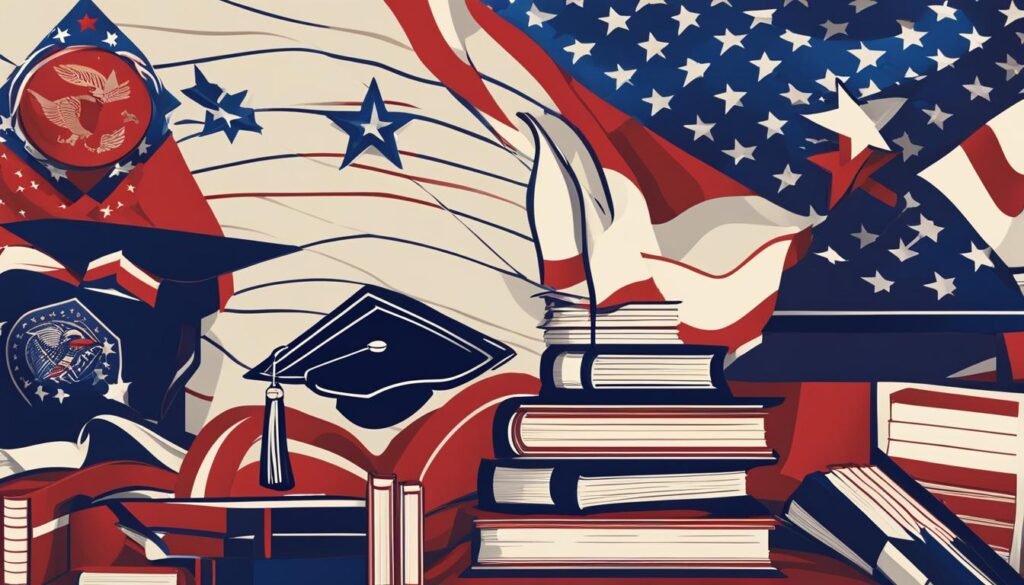
Stepping into the world of academia as a veteran, selecting the right college is a pivotal decision that can impact your future. It’s essential to consider institutions that not only support your academic goals but also understand and respect your military background. Here are several factors to bear in mind:
- Assess the veteran resources for college application preparation available at each school.
- Investigate the college admissions criteria for veterans, including whether schools have dedicated admissions counselors for veteran applicants.
- Determine the availability and accessibility of veteran support services on campus such as financial aid, housing, counseling, and career services.
The college you select should assist in the seamless transition of military credits, offering recognition for the skills and experiences you’ve gained during your service. This recognition plays a critical role in academia, giving you the acknowledgment and head start you’ve rightfully earned:
| Resource | Description | Benefit to Veterans |
|---|---|---|
| Veteran Affairs Office | Campus-based support for veterans’ specific needs | Guidance through GI Bill benefits, academic advisement, and peer connections |
| Credit Transfer Policies | Recognition of military training as college credits | Accelerates educational trajectory, potentially saving time and money |
| Veteran Scholarships and Grants | Financial assistance specifically allocated for veteran students | Eases the financial burden of education |
| Veteran Student Organizations | Campus groups dedicated to veteran students | Offers a sense of community and shared experience |
| Career Services | Career planning and job search assistance tailored for veterans | Translates military experience to civilian career opportunities |
Going beyond academic support, the right college for a veteran like you fosters a community where you can thrive. The relationship between student veterans and their college is symbiotic, one engraved with mutual growth and respect:
Every veteran carries a wealth of global experience and leadership skills—traits that, when recognized by the right college, bolster not only the veteran’s academic journey but also the college community itself.
As you narrow down your college choices, consider also the cultural aspects of each institution:
- Does the college have a track record of successful veteran graduates?
- Are there active student veteran associations where you can find camaraderie?
- What are the policies of the institution regarding deployment or training obligations?
Finally, think about the location and campus environment. After dedicating time serving your country, a campus that resonates with your personal and educational needs can make a significant difference in your college experience:
- Evaluate whether the campus atmosphere aligns with your preferences.
- Consider the proximity to family, friends, and support networks.
- Assess the availability of veteran healthcare services nearby if required.
As a veteran applicant selecting colleges, each of these aspects serves as a cornerstone to your success. Taking them into account increases your chances of finding a college that does not just teach you, but also truly values and understands you.
Writing a Compelling College Essay as a Veteran
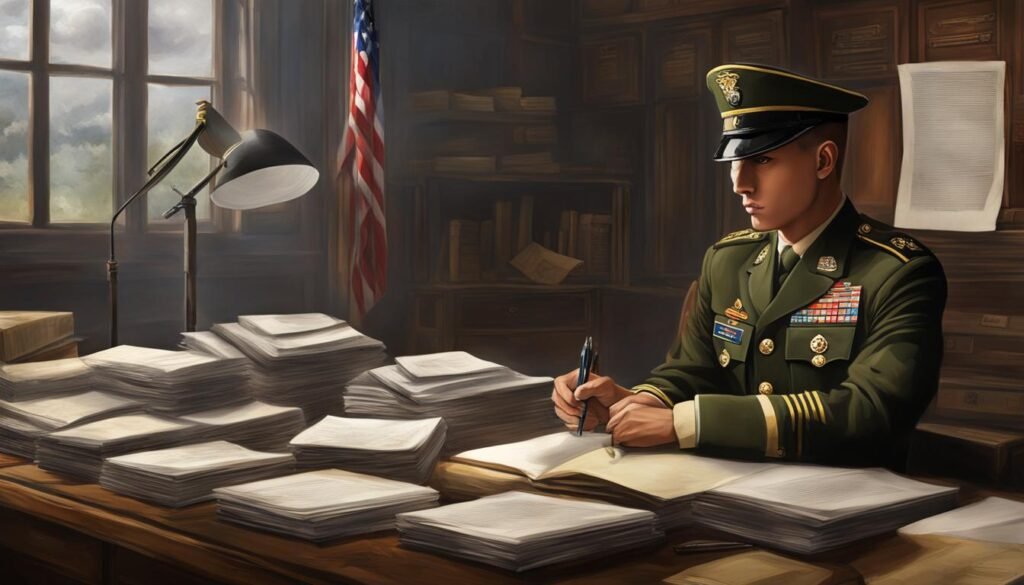
Embarking on the college application journey represents a new chapter in your life. As a veteran, you have a treasure trove of experiences and skills that can profoundly impact the quality of your college essay. Engaging in writing a compelling college essay as a veteran demands a deliberate approach in narrating personal tales of resilience and the invaluable leadership skills developed through military service, which can make your story stand out to admissions committees.
When drafting your essay, consider the most definitive moments of your service—those that shaped your worldview, character, and ambitions. The art lies in utilizing your military experience in college admissions essays in such a way that it highlights your growth, your transition, and how these experiences will contribute constructively to the college environment.
“Through the lens of my military experiences, I have cultivated a sense of perseverance and leadership that I now bring to my academic journey. These are not merely experiences from my past; they are indelible parts of my identity that inform my goals, work ethic, and perspective.”
Colleges seek students who bring a well-rounded array of experiences and the recognition of leadership skills from military service in admissions cannot be underscored enough. Military service is proof of your ability to handle challenges, lead under pressure, and engage effectively with teams of diverse individuals. Each of these attributes is highly relevant in an academic setting.
The following table serves as a guide to help you identify and translate your military experience into potent themes within your college essay. It illustrates how the skills honed in the military are transferable and how they can be compellingly woven into your narrative.
| Military Experience | Leadership Skills | Essay Narrative Themes |
|---|---|---|
| Team Missions | Collaborative Teamwork | The importance of unity and collective effort in achieving goals. |
| Overseas Deployment | Cross-Cultural Leadership | Adapting to and learning from diverse cultures; leading in multifaceted environments. |
| Critical Decision Making | Strategic Leadership | Employing foresight and strategy to achieve mission-critical objectives. |
| Navigation of High-Pressure Situations | Resilience and Adaptability | Maintaining composure under pressure and swiftly adapting to shifting circumstances. |
| Training Operations | Mentorship and Training | The role of mentorship in personal and team advancement; the value of continuous learning. |
A veteran’s college essay should be more than a recount of past missions; it should be an introspective piece that narrates your journey and makes a case for your future aspirations. This requires you to strategically select experiences that resonate with themes of growth, leadership, and the pursuit of knowledge.
- Reflect on how specific military operations have prepared you for the rigors of college coursework.
- Describe the leadership roles you assumed and how they have honed your ability to inspire and guide others.
- Share incidences where adaptability and quick thinking were pivotal, drawing parallels to how these skills will aid in academic success.
Tap into the wealth of your experiences, crafting an essay that bridges your past with the future you aim to build. In doing so, your military background becomes a powerful testament to your readiness for higher education and your potential contributions to the college community.
Veterans’ Guide to College Admissions Interviews
College admissions interviews can often seem intimidating, especially after a period of service, but as a veteran, these interactions present a unique opportunity for you. An admissions interview allows you to elaborate on your military experience and demonstrate how it translates to your prospective academic and career path. This guide will offer admissions advice for veterans transitioning to college, focusing on how you can articulate your service experiences and the strengths they have endowed you with for success in higher education.
During college admissions interviews, there are several talking points you can prepare to discuss effectively. These include leadership roles you held, challenges you overcame, and how your military service has directed your academic interests. Preparing responses that highlight your experiences will help convey the depth of your character and ambitions.
Your service has given you a distinctive edge. Use this time to give the admissions committee insight into your world—how you see it, how you’ve lived in it, and how you will bring your experiences to bear on your college experience.
- Review your military experiences: Identify key moments in your service that showcase your leadership, teamwork, and ability to work under pressure.
- Reflect on your transition: Be prepared to discuss your journey from the military to pursuing higher education, and the reasons behind your decision.
- Apply your skills to academic settings: Provide concrete examples of how skills developed in the military can translate to success in college.
- Convey your future aspirations: Share your career objectives and how your military background has prepared you for these professional pursuits.
- Prepare questions: Show your interest in the institution by preparing thoughtful questions about the campus, academics, or veteran support services.
Understanding how veteran status impacts college admissions can also provide reassurance. Schools recognize the value veterans bring to their institutions—not just diversity of experience, but maturity, discipline, and a global perspective that enriches the learning environment for all students.
| Admissions Interview Focus Areas | What To Highlight as a Veteran |
|---|---|
| Leadership Experience | Discuss leadership roles and how they’ve prepared you for group projects and campus leadership positions. |
| Problem-Solving Abilities | Provide examples of challenges faced during service and the creative or strategic solutions you implemented. |
| Adaptability and Resilience | Illustrate your ability to adapt to new situations, an invaluable skill in the dynamic environment of college. |
| Time Management | Emphasize how military precision has honed your ability to manage your time effectively, a key factor for college success. |
| Long-term Goals | Link your military experiences to your academic and career objectives, showing a clear path of progression. |
As you prepare for interviews, remember your service has instilled in you a discipline and perspective that will serve you well in this process. Use your voice to share your story, your skills, and your vision for how you will contribute to and benefit from the college experience. With the right preparation and mindset, interviews can significantly bolster your application, allowing your veteran status to truly shine as a facet of your identity in higher education.
Overcoming Challenges in College Admissions for Military Students
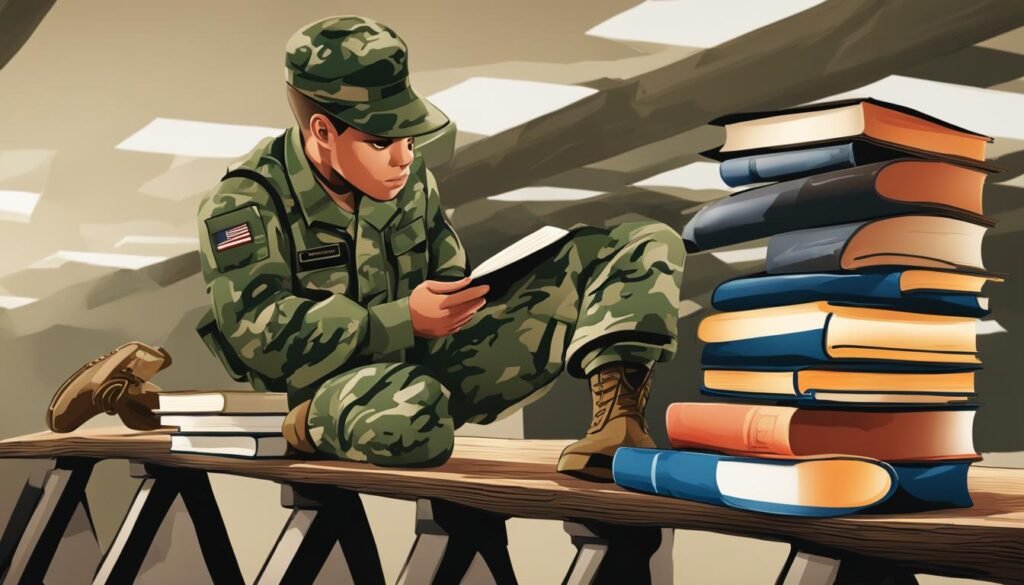
Transitioning from military life to higher education can bring a unique set of challenges for veterans. One key obstacle is overcoming educational gaps in standardized testing for veterans. Recognizing this barrier and seeking out resources and preparation programs tailored for military students is essential. Moreover, balancing rigorous test preparation with military duties requires strategic planning and utilization of available resources.
Frequently, veterans may face test anxiety when gearing up for the SAT or ACT exams. If you are a military student contending with this issue, note that it’s critical to understand and leverage the strengths gained from your military experience while preparing for these standardized tests. Let’s explore strategies to address these hurdles.
Addressing Education Gaps and Test Anxiety
Addressing the educational gaps that may exist as a result of your time in service involves prioritizing your study time and focusing on areas that require reinforcement. Here are practical steps to ease this transition:
- Seek out SAT/ACT preparation programs targeted towards veterans’ needs.
- Lean on your military-honed skills such as discipline and structure when creating your study schedule.
- Utilize online platforms that provide flexibility in timing and personalized tutoring to accommodate your service duties.
When it comes to overcoming test anxiety for the SAT/ACT as a military student, tactical approaches such as practice exams and mindfulness techniques can be very effective. Utilize these strategies to boost your confidence:
- Take practice tests under timed conditions to become comfortable with the exam format.
- Engage in relaxation techniques like deep breathing exercises before beginning study sessions or the test itself.
- Remind yourself of challenging situations you’ve already mastered during your service, reinforcing your ability to handle pressure.
Success Stories and Inspiration for Veteran Applicants
The journey to college after military service is one you do not tread alone. There are many before you who have successfully transitioned and whose stories can serve as beacons of motivation. Here are a few powerful takeaways from the success stories of military students in SAT/ACT:
Veterans who have leveraged military precision and commitment not only achieve their targets in standardized testing but also find these qualities advantageous through the college admissions process and beyond.
These tales not only demonstrate the prowess of military skills in academic settings but also reassures others that their service is profoundly valued and can be a significant asset in competitive college admissions.
Refer to the table below for a snapshot of how military service can be a major advantage when faced with the challenges of entering the academic world:
| Challenge | Military Skills That Help Overcome It | Additional Resources Available |
|---|---|---|
| Educational Gaps | Strategic planning and adaptability | Prep courses and evaluative tests |
| Test Anxiety | Stress management techniques | Mindfulness training and practice exams |
| Time Management | Disciplined routine | Schedules designed around military commitments |
In conclusion, as you, a veteran, prepare to take on the journey of higher education, be reminded that the skills and experiences earned through your service are invaluable assets to your success. Embrace them as you navigate standardized testing and the college admissions hurdles ahead.
Conclusion: Achieving Success in College Admissions for Veterans
As a veteran, balancing college admissions and ongoing military commitments can be a formidable task. However, with the help of GI Bill benefits and specialized standardized testing preparation for veterans, this challenge becomes less daunting. The benefits of standardized testing coaching for veterans are abundant, providing not only financial support but also customized strategies that align with your unique experiences and strengths developed during your military service.
Your journey from military to academic life is paved with opportunities to leverage your disciplined background for success on tests like the SAT and ACT. The tailored resources and test fee reimbursements available through the GI Bill serve as a testament to your hard-earned benefits as you transition to the role of a student. Additionally, colleges appreciate the leadership, global awareness, and rich experiences you bring to the table, adding diversity and insight to their campuses.
Remember, your military service has equipped you with an exceptional skillset that is highly valuable in the academic world. By strategically utilizing resources tailored for military students, such as standardized testing coaching, you can effectively navigate the intricacies of college admissions. Embrace your unique path and stand confident in the knowledge that as a veteran, you possess a well-deserved advantage in pursuing your educational aspirations.
Standardized Testing and College Admissions for Veterans – Frequently Asked Questions (FAQs)
Does being a veteran help college admissions?
Yes, being a veteran can help with college admissions at many institutions. Colleges recognize the skills, training, and experiences gained during military service. Veterans may receive additional consideration and preferences in the admissions process through the GI Bill, Yellow Ribbon program, and partnerships between the Department of Veterans Affairs (VA) and colleges. Many colleges have staff dedicated to supporting veteran applicants.
Will the VA pay for the LSAT?
Yes, the VA will reimburse veterans for taking the Law School Admission Test (LSAT) and other approved licensing and certification tests through the GI Bill. Veterans should submit VA Form 22-0803 along with proof of payment to receive reimbursement for test registration fees, specialized test costs, and administrative fees.
Will the VA pay for my college?
Yes, veterans can use their GI Bill benefits from the VA to pay for college tuition, housing, books, and other educational expenses. The main GI Bill programs that pay for college are the Post-9/11 GI Bill, Montgomery GI Bill, and Survivors’ and Dependents’ Educational Assistance. Eligibility and benefit amounts vary based on length of service, active duty status, and other factors.
Do veterans pay college application fees?
Many colleges offer application fee waivers for veterans and active duty military. Over 1,500 colleges participate in the Common Application fee waiver program for veterans. Veterans may also qualify for other college application fee waivers through government programs like the Department of Veterans Affairs’ VetSuccess on Campus program.
Does veteran status help with law school admissions?
Yes, veteran status can help with law school admissions. Many law schools recognize military service and give special consideration to veteran applicants. Veterans may be eligible for application fee waivers, priority deadlines, and additional scholarships at some law schools. The Law School Admission Council also approves fee waivers for the LSAT exam for eligible veterans.
Who qualifies for LSAT fee waivers?
Veterans who qualify for GI Bill benefits like the Post-9/11 or Montgomery GI Bills are eligible for LSAT fee waivers. Active duty service members are also eligible. Applicants must submit documentation confirming their GI Bill eligibility or current active duty status to receive the LSAT fee waiver. Spouses and dependents of veterans may also qualify for fee waivers under some circumstances.

